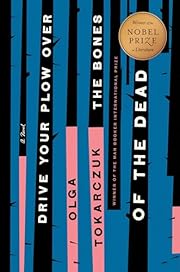I have to remind myself this isn’t some professional dispute in a journal over the results of a research paper. Two girls were murdered, and maybe many, many more. My goal is simply truth. I have to take my ego out of this. [p. 167]
There are more than enough femicides in the news, so why read fictional versions? I tend to avoid novels about serial killers who prey on young women, yet I did find The Naturalist readable, well-plotted and surprisingly sympathetic. To be fair, I made an incorrect assumption based on the sample chapters -- I thought the Big Bad would be supernatural -- and by the time I realised I was wrong, I'd been drawn into the story, and intrigued by the character of Professor Theo Cray, computational biologist and social misfit. Theo has been trained to spot patterns in chaos, and he is adept at applying the scientific method (and a comprehensive knowledge of biology, botany, ecology and geology) to the world around him. Not so adept at dealing with people ("What was I supposed to say when he mentioned her name? How was my face supposed to move? I don’t know." [p. 37]) and with some quite old-fashioned ideas, or perhaps unquestioned instincts, regarding women.
It's the usual thing: maverick lone wolf finds something that all the professionals have missed; he (or she) is mocked and ignored, but ultimately proven right, though not without idiosyncratic acts of heroism, a few broken laws, a couple of dead ends and one or more unnecessarily dead bodies. What made this murder mystery unusually interesting, for me, was Cray's use of science to unravel the case. He spots burial sites because of the mix of plants growing there; he recognises a predator's circuit in the pattern of crimes; he develops an algorithm to identify comparable murders, and observes that it's not that accurate -- it's just that there are many more murders than anyone has realised.
I found Cray annoying at times, but that was, I think, because of some aspects of his character: he doesn't score highly on empathy, in the sense of understanding how his actions might appear to others, and his attitude to women he finds attractive is, by his own admission, somewhat chauvinistic. But I liked him, and Mayne's prose, enough to acquire the next in the series.













